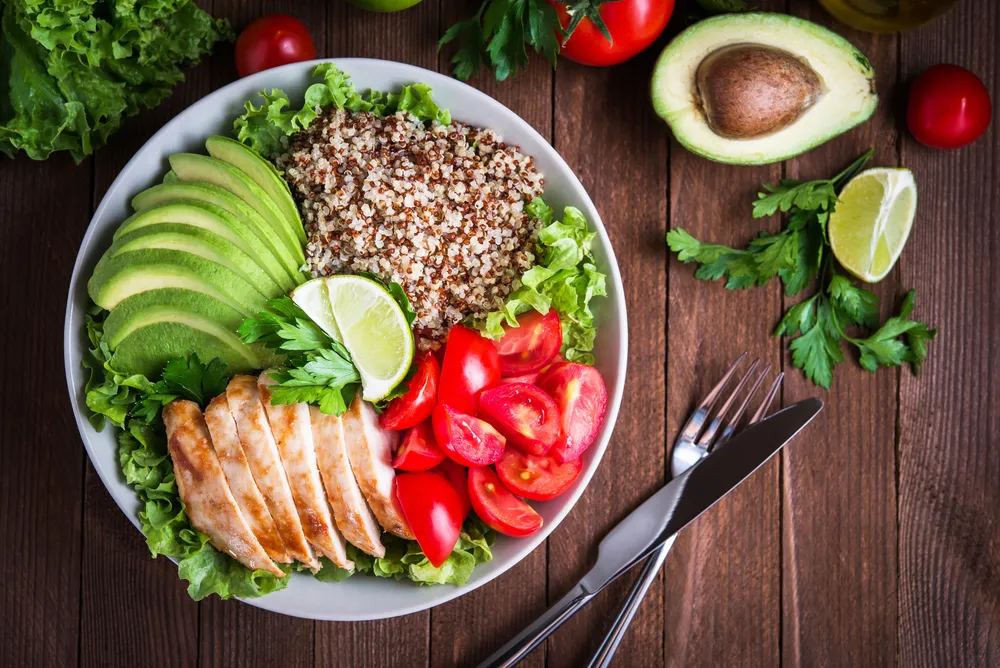
Maintain a healthy weight isn’t just about appearance; it’s crucial for overall health. A healthy weight reduces the risk of chronic diseases, improves energy levels, and enhances quality of life. This guide will provide practical, science-backed tips for maintaining a healthy weight naturally.
Table of Contents
- Why a Healthy Weight Matters
- Key Natural Tips for Weight Maintenance
- Mindful Eating
- Balanced Nutrition
- Regular Physical Activity
- Quality Sleep
- Foods to Support Healthy Weight
- Common Pitfalls to Avoid
- Sample Daily Routine for Weight Maintenance
- Frequently Asked Questions
- Conclusion
1. Why a Healthy Weight Matters
Maintaining a healthy weight has numerous benefits:
- Reduces the risk of heart disease, diabetes, and hypertension.
- Improves joint health and mobility.
- Enhances mental well-being by reducing stress and improving self-esteem.
Being either underweight or overweight can lead to health complications, making it essential to find and maintain the right balance.
2. Key Natural Tips for Weight Maintenance
A. Mindful Eating
Mindful eating is about being fully present while eating, which helps prevent overeating and improves digestion.
How to Practice Mindful Eating:
- Eat Slowly: Chew thoroughly to give your brain time to signal fullness.
- Eliminate Distractions: Avoid eating while watching TV or using your phone.
- Listen to Your Body: Eat only when hungry, and stop when satisfied.
| Mindful Eating Technique | Benefit |
|---|---|
| Eating slowly | Prevents overeating |
| Avoiding distractions | Encourages portion control |
| Paying attention to hunger cues | Reduces emotional eating |
B. Balanced Nutrition
A balanced diet is the cornerstone of weight maintenance. Focus on nutrient-dense foods that provide energy without excessive calories.
Key Nutrients:
- Proteins: Promote satiety and muscle repair.
Examples: Chicken, eggs, lentils. - Healthy Fats: Support hormone regulation and long-term satiety.
Examples: Avocado, nuts, olive oil. - Complex Carbohydrates: Provide sustained energy.
Examples: Brown rice, oats, sweet potatoes. - Fiber: Aids digestion and reduces hunger.
Examples: Vegetables, fruits, whole grains.
| Food Group | Examples | Benefit |
|---|---|---|
| Proteins | Chicken, tofu, lentils | Increases satiety |
| Healthy fats | Avocado, almonds | Supports hormone balance |
| Complex carbs | Quinoa, sweet potatoes | Provides steady energy |
| Fiber-rich foods | Broccoli, apples | Promotes digestive health |
C. Regular Physical Activity
Exercise is essential for burning calories and maintaining a healthy metabolism.
Recommended Activities:
- Cardio: Running, cycling, or swimming boosts calorie burn.
- Strength Training: Builds muscle, which increases resting metabolism.
- Daily Movement: Activities like walking and climbing stairs add up.
| Activity Type | Example | Frequency |
|---|---|---|
| Cardio | Jogging, cycling | 150 minutes per week |
| Strength Training | Weightlifting | 2-3 times per week |
| Daily Movement | Walking, cleaning | Incorporate daily |
D. Quality Sleep
Lack of sleep disrupts hormones like ghrelin and leptin, which regulate hunger and appetite.
Tips for Better Sleep:
- Maintain a consistent sleep schedule.
- Avoid screens for 1-2 hours before bedtime.
- Create a relaxing bedtime routine.
| Sleep Improvement Tip | Effect on Weight |
|---|---|
| Consistent sleep schedule | Regulates hunger hormones |
| Screen-free time | Promotes restful sleep |
| Relaxing bedtime routine | Reduces stress-related overeating |
3. Foods to Support Healthy Weight
Certain foods naturally support weight maintenance by promoting satiety and boosting metabolism.
| Food | Why It Works |
|---|---|
| Eggs | High in protein, keeps you full |
| Greek Yogurt | Rich in protein, aids digestion |
| Leafy Greens | Low-calorie, nutrient-dense |
| Green Tea | Contains antioxidants, boosts metabolism |
| Whole Grains | Provide lasting energy |
4. Common Pitfalls to Avoid
Avoid these common mistakes that can hinder your weight maintenance journey:
| Pitfall | Why It’s Harmful |
|---|---|
| Skipping Meals | Leads to overeating later |
| Overeating “Healthy” Foods | Calories can still add up |
| Relying on Fad Diets | Often unsustainable and unbalanced |
| Ignoring Stress | Leads to emotional eating |
5. Sample Daily Routine for Weight Maintenance
| Time | Activity |
|---|---|
| 7:00 AM | Wake up, drink water, and do light stretches |
| 7:30 AM | Eat a balanced breakfast (e.g., eggs, avocado toast) |
| 12:30 PM | Enjoy a nutrient-rich lunch (e.g., grilled chicken salad) |
| 4:00 PM | Healthy snack (e.g., apple with almond butter) |
| 6:30 PM | Engage in physical activity (e.g., 30-minute walk) |
| 8:00 PM | Eat a light dinner (e.g., salmon with quinoa and veggies) |
| 10:00 PM | Relax and prepare for quality sleep |

6. Frequently Asked Questions
Q: How much water should I drink daily?
A: Aim for 8-10 cups of water per day, but adjust based on activity level and climate.
Q: Can I enjoy treats and still maintain a healthy weight?
A: Yes! Moderation is key. Enjoy small portions occasionally without guilt.
Q: How long does it take to see results?
A: Weight maintenance is a lifelong process, but you may notice improvements in energy and mood within a few weeks.
7. Conclusion
Maintaining a healthy weight naturally involves a combination of mindful eating, balanced nutrition, regular exercise, and quality sleep. It’s not about perfection but consistency. Small, sustainable changes can lead to lasting results and a healthier, happier life.









